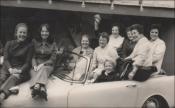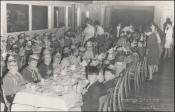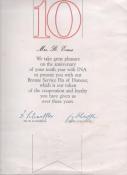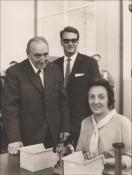Browse the interviews
Sorted by interviewee name
VN019 Nancy Denton, B.S.Bacon toy factory, Llanrwst
Nancy went down to the toy factory on leaving school to ask for a job, as you were expected to work. She didn't really like it “but it was a job and you had to take it. Some parts of it I liked and some I didn't.” She did like “doing my easels, yes, I used to like doing that.” But she says she got bored with the routine, the same thing all the time. She mainly did the easels and blackboards, knocking the nails in and sanding down the wood, and also using staple guns, which used to 'jump.' The toys were good quality and a well-known brand, Bacon's they knew it as, but it might have been Valley Toys. There were no perks, if there was a reject they couldn't take it “no way, could you heck, no.” There was no bonus at Christmas “we didn't even know what that was.” The factory was very basic but she enjoyed the camaraderie there. She left the factory at 17 and got married shortly after. She did return to work afterwards but never did factory work again.VSE078 Margaret Duggan, JR Freeman's Cigar Factory, Cardiff
Margaret was born in Ireland and she left school at 17 (1964) after doing a course in a technical college. She worked as a cook initially. Between 1966 and 1970 she worked for General Electric (EI) and then she married and moved to Wales. She started working in Freeman’s. She describes making the cigars. She caught her hand in the machine – 8 stitches. She had compensation through the union. Changed jobs – check weigher. Targets – e.g. how many they could get out of one leaf. She could walk around and chat. She had a set wage. Strong smell of tobacco, conditions improved and they were given masks to wear. Fine mist to keep tobacco moist. Paying tax on the cigars, she did the finished order audit. She left in 2002 when she was 55. She received a watch for 30 years’ service. Good pay and bonuses every Xmas and Easter. Extra holidays depending on period of employment. Tobacco Worker’s Union – dispute about finishing at 1.30 on Friday – union won. She had redundancy pay. In the beginning it was a workers’ market. Newsletter – Smoke Signals. Perks - free cigars and cigarettes every month. Social clubs, e.g. golf and badminton. The company paid for her to go on a computer course. Xmas draw and dinner. Family place.VN045 Joyce Edwards, Sweet factory, St Asaph
Joyce worked in a grocer's shop for two years before going into the sweet factory, in about 1952 when she was 17, where she worked for two years. The factory made Spearmint Chews and lollipops for holidaymakers and it was seasonal work. From November till March they'd be out of work. She wrapped the sweet by twisting a piece of paper round, and there were two men in the back who mixed the mixture in big bowls, and there was a machine that pressed the chews out. If something happened and the machine broke down, they couldn’t keep up with the chews for the girls to wrap, and they couldn't do their full quota . There were no doors between the back and the main room and the acid in the lollies got into Joyce's fingers. It built up like a boil, and she used to break it and clean it and put a plaster on, but one broke out under her nail, for which she had to go to the doctor. She also had the job of tidying of the storeroom as it was a bit of a jumble in there because the girls used to just dive in and grab the papers and grab the boxes, drop things everywhere. There was a good camaraderie, and the girls weren’t bad. The hours were long and there was no messing about. After leaving the sweet factory, Joyce worked in the milk bar in St Asaph and then in a hospital, becoming canteen supervisor.VN049 Mavis Coxe and Sheila Edwards, Graessers Salicylates, Sandycroft
Mavis began in Gressors pharmaceutical factory in 1954, as a clerk in the office. This was as a post-girl, which was starting at the bottom basically, and you work your way up. She enjoyed it because she used to have to go all through the factory, taking mail around different departments and record all the letters that went out, put stamps on them and such like, and making tea and coffee for the bosses. She did that for about ten months, then an opening came up in the office of the Service Department, and she went into that and was there until 1965. Sheila got the job through her sister, but in the packing dept, which involved some packing but also some clerical work. Both left in 1964-1965, Sheila for a job with more money and Mavis after a dispute with her boss. Mavis took six years out to have children then went back into admin work with another company.VSW025 Beryl Evans, Ina Bearings, Bynea
Beryl left school at 14, and worked in the Felin-foel brewery, 1941-8, before getting married. Her husband didn’t like women working in factories. Then she lost her husband and she had to go to work in INA Bearings to maintain the family. She was on inspection there. She talks about the factory nurse, the noise of the machines, clocking in, the children’s Christmas parties, getting a clock for long service and trips. She left the factory in 1982.Part of this interview is available as an audio file




VSW016 Catherine Evans, Anglo-Celtic Watch Co. (inc. Smith's Industries and Ingersoll aka 'Tick Tock'), Ystradgynlais
Catherine left the grammar school at 16 and after working in a shop, she, like everyone else in the area, went to work in the Tick Tock factory from c.1958 until she had her first child in 1967. She describes learning the craft of getting women’s watches to ‘breathe’ and teasing new girls. She recalls Christmas parties there when she was a child and buying watches cheaply. She talks about the role of the foreman – always a male. It was a clean and happy factory with lots of singing. She remembers both Welsh and English being spoken there and the family atmosphere.VSE076 Christine Evans, Sobells, Rhigos
Christine left school at 15 (1964) and started in Sobell’s where her father worked. The factory was booming. She started on soldering and wiring. The job wasn’t difficult but doing it to speed was. Full pay at 18. Moved to work on transistor radio – so proud when she bought her own. Bussed to the industrial estate. She did different jobs e.g. putting components in. Describes procedures. In the late 60s she worked on colour TVs. Dangers – she has scars on her thumb (glass) and legs from solder burns because they wore mini skirts. Sobell’s gave her cutters and pliers. Exciting to be making colour TVs. Hitachi ran the factory in 1980 when she left because she was pregnant. Union and lots of strikes about money. Three day weeks. She talks of being put on a dangerous machine at 15 – no guard on it. Some bullying – moved to another line. Music and records and singing. Miss GEC competition in Top Rank, Swansea. Day before Xmas – stopped work, ate chocolates and drank. Later she did an NVQ in cateringVSW014 Gwen Evans, Morris Motors, Llanelli
Gwen left school at 14 (1936), then she worked on a farm and as a cleaner. During the war she worked in Morris Motors – every factory had to employ one disabled worker per 100 able. She had a weak arm. It was good money (c. 1940) – pocket money from it. The work on the car and aeroplane radiators was heavy. Since a labourer had to help her she was paid less. There was a fuss when the Union started – she paid a groat but anonymously. She remembers the girls buying goods from catalogues. She refused to move to harder work – by showing her disabled card. Bruising from handling the radiator blocks. It was a noisy factory which has affected her hearing. Lots of joking and singing. She went on holiday with the girls, fun at Xmas. During the war, stars from the entertainment world visited. She got married (1953) – received a clock as a present. She left c.1981.VSW051 Jean Evans, Mettoys, Fforestfach;John Stanton, Abertawe
Jean left school at 15 (1960) and worked in the Home and Colonial shop Swansea. After c.8 months she moved to Mettoys. Hard work, everything was weighed and she was paid according to what was in the pallets. Moved around – onto assembly making toys. She left when she had her boy but returned on evening shift after eight months. She was in the Fettling Dept., cleaning car parts. Then went on to inspecting, ready for packing. Reported sub-standard work. Then given more responsibility – in charge of others. Left because tired of evening work and landed up in John Stanton sewing factory. But returned in three weeks to Mettoys. Left then to work as a domestic. In Mettoys the manager did spot checks. The white coats were mostly men. She came out of her shell in the factory. They had fun.VSW027 Joyce Evans, Anglo-Celtic Watch Co. (inc. Smith's Industries and Ingersoll aka 'Tick Tock'), Ystradgynlais
Joyce left school at 15 (1947) and started at Tick Tock (1947-1962) – then 9 years ‘out’ with the children and returned for 17 years (1971-88). It was difficult to get in there – you had to pull strings. Making coils for aeroplanes. When they started making watches she went on inspection on the Anglo site - a beautiful dust-proof building. In the beginning she was too frightened to go to the toilet. The boys in the automatic department used to whistle. In the dust-proof area – special rubber shoes and overalls. Making c.3000 watches a day (setting them by hand), and on to a further 7 regulation racks before ready. She was also a floater. When the Enfield clock factory opened she trained for the swing shift (4.30-9.30), mainly married women –friction with day shift, because they were hitting targets. Marriages announced in Tick Tock magazine. Her husband was a shop steward with AEU. Strict rules – Personnel Officer. Back injury – because of factory? When she got married in 1951 her colleagues gave her an Enfield clock. Dancing classes, dances and trips. The new young workers (1980s) had no respect and used bad language.

